- Home
- Jodi Picoult
Larger Than Life
Larger Than Life Read online
Larger Than Life is a work of fiction. Names, characters, places, and incidents either are the product of the author's imagination or are used fictitiously. Any resemblance to actual persons, living or dead, events, or locales is entirely coincidental.
2014 Ballantine eBook Edition
Copyright (c) 2014 by Jodi Picoult
Excerpt of Leaving Time copyright (c) 2014 by Jodi Picoult
All rights reserved.
Published in the United States by Ballantine Books, an imprint of Random House, a division of Random House LLC, a Penguin Random House Company, New York.
BALLANTINE and the HOUSE colophon are registered trademarks of Random House LLC.
This book contains an excerpt from the forthcoming book Leaving Time by Jodi Picoult. This excerpt has been set for this edition only and may not reflect the final content of the forthcoming edition.
eBook ISBN: 978-0-553-39210-4
www.ballantinebooks.com
Cover design: Gabrielle Bordwin
Cover photograph: gungerguni/Getty Images
v3.1
Contents
Cover
Title Page
Copyright
1999, Botswana
Excerpt from Leaving Time
About the Author
Other Books by This Author
1999, Botswana
Moments after receiving the worst news of my life, I drive into the middle of a massacre.
The five elephants lie on their sides, dusty hills, aberrations in the landscape. Flies swarm around the black blood that has seeped into the dirt, and overhead spins a pinwheel of vultures.
I park the Land Rover beneath a mopane tree and walk toward the bodies. I am looking for signs of life, although I know I won't find them. I'm not sure how the poachers took this herd down. They use guns and spears, sometimes arrows poisoned with acokanthera. I've heard of watering holes being contaminated, of the elephants dropping like boulders after they drink.
The largest elephant is one I recognize. Karabo has a half-moon torn from her right ear, which is now draped over her face like a shroud. I fold back the skin as I would smooth clean sheets on a bed, revealing the gash in her flesh. Her face is a blunt cliff of brow where her trunk and the tusks have been sheared away.
I lean over and get sick in the brush, bracing my hands on my knees. Pull yourself together, Alice, I tell myself. You have a job to do.
I have seen death in the bush before, and there is always a protocol. When an elephant dies, we researchers dutifully record the place and time of death in the data we keep on the herds. We contact a ranger, so that the tusks can be removed before villagers can come at night to cut them away, to sell them on the black market. We leave the carcass to the vultures and the jackals and the hyenas. But what are we supposed to do when the tusks are already missing? When they were the reason for the slaughter?
I've been told that the Chinese believe elephants shed their tusks like deer shed their antlers, that they have no idea that the ivory pendants and carvings they covet come at so great a cost. They also don't realize the collateral damage: In addition to the five elephants from this herd who were slaughtered, there are more who ran frantically from the poachers--and who no longer have a matriarch to lead them to food and water, to steer them away from danger. When the matriarch is gone, so is the herd's collective memory.
In this moment, it's too much for me, and I start to cry. Because bad things happen all the time. Because I am too late. Because yesterday these elephants were part of a family, and today they are not.
Maybe it is the noise I'm making, maybe it is just a shift in the wind that carries the scent of me--too human--across the bush. But suddenly there is a rustling sound that draws my attention. I look up and see an elephant calf, so young that her trunk still dangles like a broken comma, peeking from behind the mountain of her dead mother's spine.
She can't be much older than a week or two; she's less than three feet tall at the shoulder. The calf pushes against the body, trying to rouse her mother. She stretches her trunk toward her mother's mouth, which is how she would normally check in for comfort, but there is no mouth anymore.
There is no mother.
"Hey, sweetheart," I soothe, keeping my voice low, which is what elephants like. "Hey, now, you're all right."
I move forward before I can think better of it. She may not be a full-grown elephant, but she still easily outweighs me by more than 150 pounds. I do not want her to startle and run--and yet I know she won't. She will stand by her mother's body until she wastes away.
I've seen it with my own eyes.
Until a few months ago, I worked in South Africa, at Madikwe Game Reserve. The elephants there were juveniles, survivors of the massive culls in the Kruger Park that were meant to control the elephant population through the mid-1990s. From a helicopter, government hunters would dart the matriarch with scoline, which is prohibited for human use because it causes total paralysis while conscious. When the matriarch fell, the members of her herd would bunch around her, confused and frantic. Without the matriarch telling them where and when to run, the rest were easy to kill. The calves were spared, and because they would not leave their mothers' bodies, they were rounded up with no difficulty. They were sent to zoos and circuses overseas, or put together in forced herds on reserves, like the one in Madikwe. The hope had been that these orphans could form new family units, together. But that wasn't how it worked out, in the long run. They became abnormally aggressive in the absence of the social guidance they would have been given by a matriarch in the wild.
There had never been culling here in Botswana, so there are no reserves for orphans here. If I let my new boss, Grant, know that I've found this calf, I will be told to let nature take its course.
I get close enough to the calf to see the hairs that sprout from her head, the dark smudges of her eyes.
The job of scientists is to study wildlife but not to interfere with it. That's why we are called naturalists. Yet there have been too many times in the past year when I've wondered if that might just be an excuse for not having to be held responsible when something goes terribly wrong.
The calf and I both startle as one of the vultures dives like a missile, landing on the body of the elephant, pecking at the raw flesh. I turn, flailing my arms and shouting until the bird rises into the sky again, momentarily eclipsing the sun.
When I look back at the calf, she takes two steps closer, and that's when I know that I'm going to break all the rules. Again.
I was ten years old, standing on an overturned crate behind a podium, trying desperately not to throw up. My hands were sweaty and my knees were banging together, and through the sea of faces in the audience, I was searching for the only one who mattered. She knew that our presentations were today. She'd promised me she would be there.
"The life of an elephant and the life of a human," I said, barely audible, "are not so different." My fingers clutched the watercolor painting I'd done of an African elephant; I had to make a conscious effort to relax my grip. I knew that my face was red and that everyone was staring at me because of it, which only made me blush even more. Speaking in public had never been easy for me, but today, having to present my animal research project to a packed gymnasium, was terrifying.
I swallowed hard. "Over the course of a lifetime, elephants both affect and are affected by their environment. Elephants live in female herds. The matriarch--the oldest in the family--makes all the decisions."
I glanced at my teacher, who gave me a smile of encouragement, and just then I saw a movement at the rear door of the gym. She didn't look like anyone else's mother. Even in her parking patrolwoman uniform, there was not a hair out of place and her makeup was impeccable. She might h
ave been a movie star, playing the role of a public servant. "Elephants communicate, not just with rumbles and roars and gestures but also with sounds too low for us to hear."
Suddenly, my mind went blank. I could not remember a single word; I couldn't find the familiar landmark of the next sentence. My breathing became the heartbeat of the world.
I had practiced this presentation in the shower, while brushing my teeth, while riding on the bus. I had practiced this presentation until it was the first thing to pop into my head when I woke up in the morning. As it turned out, there was something worse than public speaking: forgetting the speech.
Then my mother cleared her throat.
My chin jerked up, and our eyes locked. For a moment there was no one else there with us--just me with my flaming cheeks, and her, with disappointment tugging at the corners of her mouth. Then, gradually, I started to hear sounds. My heart thudding. The tick of my teacher's watch. The creak of chairs, as other parents shifted uncomfortably in the silence.
Just like that all the words were back, pushing at the gate of my teeth. I raced to the end of my speech. There was a pause as everyone waited to see if there was more. But then I bowed stiffly and ran off the stage, and Eddie Raheed began to talk about the orangutan as easily as if he were reciting the alphabet.
Later, juice and cookies were served. Kids ran to their parents, whose arms folded tight around them like the wings of giant birds. I found my mother leaning against a gym mat hanging from the wall, and I handed her the telescope tube of my elephant painting.
My mother unrolled the watercolor as if she were about to read from an ancient scroll. She stared at it for a moment before curling it into a cylinder again. "Well," she said. "That could have gone better."
In all the years since then, I have never forgotten a single fact about elephants.
I keep waiting for the punch line to the joke: How do you get a 250-pound calf to follow you home?
Very carefully.
The calf doesn't react when I take a length of rope I've found in the back of my vehicle and loop it around her belly, under her arms, knotting it at her back to create a makeshift leash. I grab the rifle that is on the hood of my Land Rover, standard equipment in the bush, just in case. But the minute I try to walk with her, she digs in her feet and will not budge.
I don't really have a game plan here. I cannot load the calf into the back of my vehicle by myself. And I can't radio a colleague and call in a favor, because that means putting another researcher at risk for punishment. Which means that if I want to transport this elephant anywhere, she's going to have to be a cooperative partner.
"Listen," I say, "I'm doing this to help you."
If I do not take the calf with me, she will die--it's really that simple. She needs her mother's milk, and her mother can no longer provide it. Even if her aunts and sisters return--although there's every reason to believe they won't, since they now associate this spot with violence at the hands of humans--they won't feed the calf. If they share their milk with this newborn, there won't be enough to sustain their own babies. Eventually, the calf will fall behind the herd, weak and dehydrated, and putting the interests of the whole herd over the individual calf will cause them to leave her.
I tug on the rope again. She is less than three feet tall; surely I can make her budge. "Please?"
The calf shakes her head, flapping her ears. They are still pink, undercooked, translucent. She sticks her trunk straight out and trumpets feebly.
I know of other countries in Africa that have elephant orphanages--as well as staff and planes and medicine and everything needed to mount a rescue operation. Me, I have a length of rope, and my sheer stubbornness.
Even if, by some miracle, I am able to sneak the calf into camp--then what? I don't know what to feed her. I can't keep her hidden without Grant finding out what I've done. But I also can't leave her behind and get up tomorrow morning and pretend it is just another day.
The little elephant turns her back on me and hurries toward her mother. She fusses near the dead elephant's armpit, searching for a teat. When she can't reach one, she pats her mother's hide with her trunk.
When I was a child, I was terrified of thunderstorms. Even after my mother came into my bedroom and explained the mechanics of rising and falling air currents and friction and electrical charges, I'd cry until she pulled me into her arms and rocked me. I'd pat her back, as if she were the one who needed comfort, but really, it was just to make sure she was still there.
We know that elephants grieve. We know they will return for years to the site where a family member has died. I can only imagine, then, that when an elephant sees her mother murdered, she will relive that moment for the rest of her life. She will mourn, just like I would.
"I know you don't want to let her go," I say to the calf.
The elephant is no longer looking at me. She is staring at the rifle I hold in my other hand, the one I've pried from its latches on the hood of the Land Rover.
I feel a sharp pain in my chest as I realize that this calf does not differentiate me from any of the humans who killed her family while she watched. I realize she expects to be next.
As stupid as it is to try to single-handedly transport an orphaned elephant the distance back to base camp, it is even more stupid to do it on foot. There are predators in the wild who could easily make a meal of a 125-pound woman and a newborn elephant. They could track us by scent, move in stealth, and kill me before I even understood what was happening. This is why, of course, even in the safety of our vehicles, we always carry rifles.
Yet I now place my rifle back into the Land Rover, leaving me completely unarmed and at the mercy of the bush. That same rifle--in my hands--will make it impossible for me to convince the baby to move.
Yes, I am being reckless.
Yes, I know the stories of even highly skilled native rangers who've been killed in the wild.
Yes, I know better.
But that baby elephant, she starts to follow me.
To say elephants have been around forever is not really an exaggeration. There are examples of elephants in art since the Paleolithic era. Romans included elephants in mosaics in Tunisia and Sicily. The Mbuti people of Africa believed that the souls of their ancestors returned as elephants; chiefs from other tribes were buried with elephant tusks. The Airavata--mythological father of all elephants in Hinduism--is associated with lightning and thunder. Ganesha, with his elephant head, is one of the most important Hindu deities, and it is he who removes obstacles. According to Buddhist lore, Buddha was a white elephant reborn as a human. The year 570, to Muslims, is when Mohammed was born ... and it is also called the Year of the Elephant.
Elephants have been around forever--but they have not been ubiquitous. When James Stevenson-Hamilton came to the Sabi Nature Reserve in South Africa a hundred years ago to be its first warden, he couldn't find a single one. Through conservation, the numbers slowly grew, but then from 1979 to 1989, the population of elephants in Africa plummeted again, from 1.3 million to 600,000, mostly due to illegal poaching for ivory. In 1989 the trade of ivory was banned, allowing their population to rebuild. Then in 1997 Botswana, Namibia, and Zimbabwe were allowed to downlist their elephants to a less endangered status, and the taste of ivory led to a surge in the hunger for it again. It was like trying to hold back a tide. But poaching was no longer a trickle; it had become a flood.
The first sign of poaching is a disparity of gender in an elephant population--too few males, who are being picked off for their ivory. When the big males are gone, poachers turn to the matriarchs, whose tusks are next largest in size. But in killing the dominant female in a herd, they destroy the collective knowledge of the entire family. They sentence to death the young calves still being nursed. They leave the surviving elephants with long-term deficits in communication, decision making, and transfer of knowledge. The matriarch is a knot that holds together a rope made of many strings. Cut the rope below the knot, and it unravels.
There is a part of the game reserve that is set apart for tourists who pay exorbitant amounts of money to come on safari, to photograph the Big Five, and to stay in lovely thatched huts with luxurious furnishings. And then there is the place where the rest of us live: small, spartan buildings with kitchenettes and box fans, and toilets that work about half the time you need them to.
My cottage is at the end of a long row, set apart from the other huts inhabited by researchers, as if it were an afterthought. This is due to seniority--I was the last to arrive, and thus am the farthest from our communal office space. It is not usually something I complain about, except for the times I've had to walk home alone on a moonless night and have been scared out of my wits by a warthog running across the path. Tonight, though, I'm grateful, because my cottage's location will make it easier to hide what I've brought back to camp.
I'm grateful, too, for the darkness. Walking through the bush as the day bled out, tethered only to the umbilical leash of the calf, I felt like I had a target on my back. The bright neon eyes of the jackals and bush babies became a lion's or a leopard's in my imagination; every flutter of a bird's wing and crack of a branch made my heart skip a beat. But now night's a veil, a curtain that lets us slip past the watering hole, past the boma where the paying guests are enjoying their dinner, toward the residences.
The only buildings even farther down the road than my cottage belong to the rangers. The local Tswana men who are lucky enough to have those jobs sleep there in barracks. They are often four or five hours' drive from their home villages, and get only a few days off a month. Sometimes, their families will come to visit, staying overnight in the rangers' village. We all know and like the rangers and get on easily with them, but when the sun goes down, they amiably go their way and we go ours. The other researchers and I will convene in the office to open a bottle of wine or play cards while the rangers' lights are all out before 9:00 P.M. They will be up at 3:30 A.M. servicing the vehicles and sweeping the reserve to assess what's happened overnight--a hyena that has finally given birth, a dead giraffe, the tracks of a leopard stalking its prey.

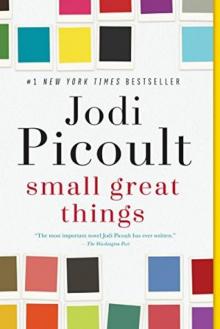 Small Great Things
Small Great Things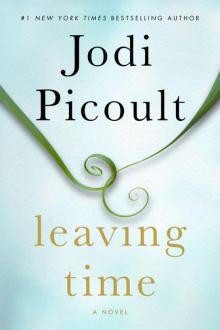 Leaving Time
Leaving Time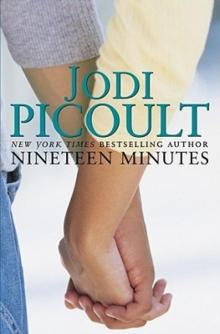 Nineteen Minutes
Nineteen Minutes Larger Than Life
Larger Than Life Perfect Match
Perfect Match My Sister's Keeper
My Sister's Keeper The Pact
The Pact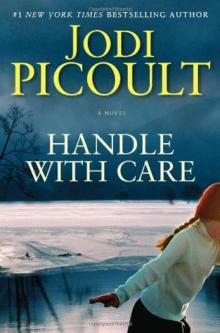 Handle With Care
Handle With Care Songs of the Humpback Whale
Songs of the Humpback Whale Mermaid
Mermaid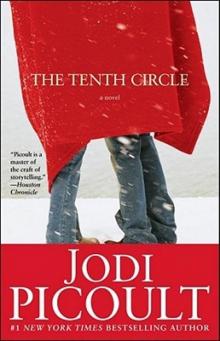 The Tenth Circle
The Tenth Circle The Color War
The Color War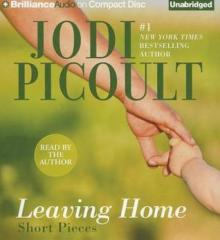 Leaving Home: Short Pieces
Leaving Home: Short Pieces House Rules
House Rules Lone Wolf
Lone Wolf The Storyteller
The Storyteller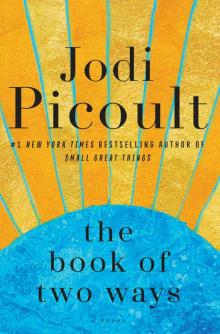 The Book of Two Ways
The Book of Two Ways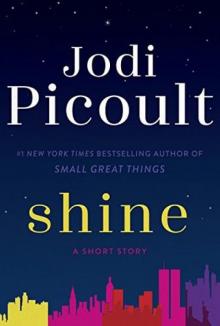 Shine
Shine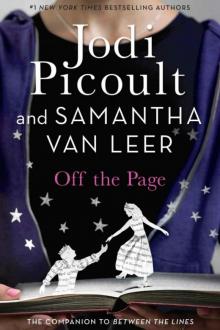 Off the Page
Off the Page Sing You Home
Sing You Home Second Glance: A Novel
Second Glance: A Novel Mercy
Mercy Vanishing Acts
Vanishing Acts Between the Lines
Between the Lines Plain Truth
Plain Truth Salem Falls
Salem Falls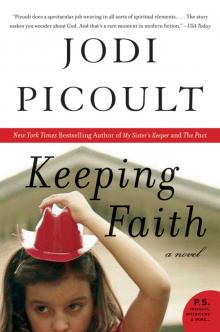 Keeping Faith
Keeping Faith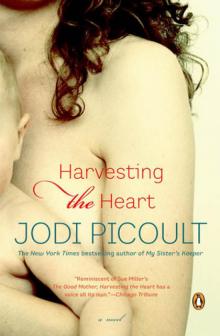 Harvesting the Heart
Harvesting the Heart Change of Heart
Change of Heart Where There's Smoke
Where There's Smoke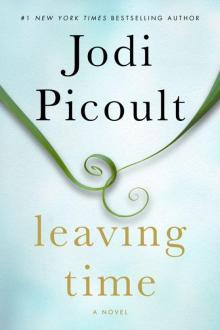 Leaving Time: A Novel
Leaving Time: A Novel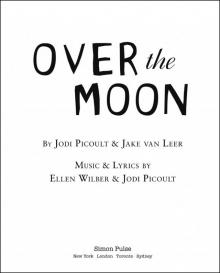 Over the Moon
Over the Moon House Rules: A Novel
House Rules: A Novel The Jodi Picoult Collection #2
The Jodi Picoult Collection #2 Leaving Home: Short Pieces (Kindle Single)
Leaving Home: Short Pieces (Kindle Single) My Sister's Keeper: A Novel
My Sister's Keeper: A Novel![Mermaid [Kindle in Motion] (Kindle Single) Read online](http://i1.bookreadfree.com/i1/04/03/mermaid_kindle_in_motion_kindle_single_preview.jpg) Mermaid [Kindle in Motion] (Kindle Single)
Mermaid [Kindle in Motion] (Kindle Single) The Jodi Picoult Collection #4
The Jodi Picoult Collection #4 Sing You Home: A Novel
Sing You Home: A Novel The Jodi Picoult Collection
The Jodi Picoult Collection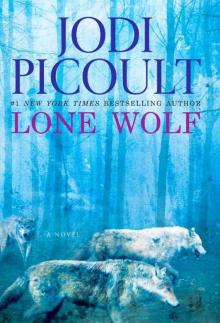 Lone Wolf A Novel
Lone Wolf A Novel Second Glance
Second Glance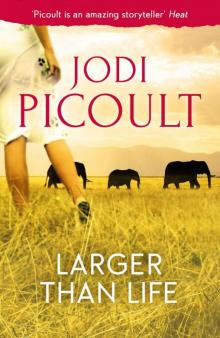 Larger Than Life (Novella)
Larger Than Life (Novella) The Jodi Picoult Collection #3
The Jodi Picoult Collection #3